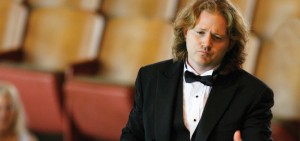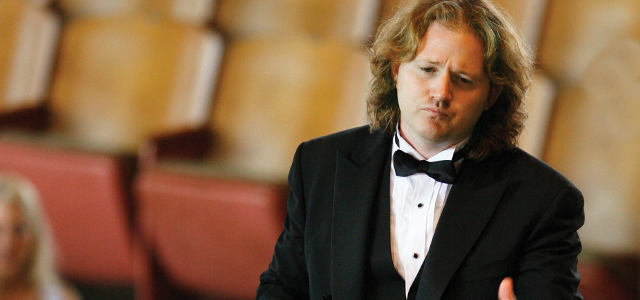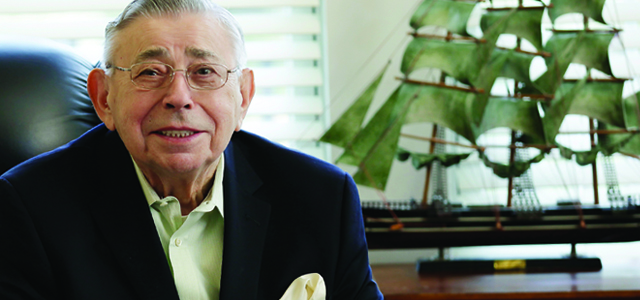Jason C. Tramm infuses his love of music and teaching with a passion and purpose that have enriched the repertoire of Seton Hall. As the University’s director of choral activities and an assistant professor, Tramm has worked to open Seton Hall’s doors to new musical experiences since his arrival in September 2011.
With his background and experience, the opportunities are many. As the artistic director of the New Jersey State Opera, Tramm is in a position to blend the voices of the State Opera with those of his Seton Hall students, as he has done in several performances throughout the year.
Named a 2012 Emerging Artist by Symphony Magazine, Tramm has had his interpretations of symphonies, operas and choral masterworks performed in Albania, Italy, Romania and throughout the United States. He has worked with some of opera’s finest voices and serves as music director-in-residence of the Ocean Grove Camp Meeting Association, where he leads one of the country’s most significant summer music programs. He holds degrees in music from the Crane School and the Hartt School, and a doctoral degree in conducting from Rutgers University, where he was the recipient of the prestigious Presidential Fellowship.
Tramm’s fearless approach to music began as a boy when he sang as a soprano soloist at Saint Thomas Church in West Nyack, N.Y. His musicality spread to include performance of piano, viola and string instruments. Singing, then conducting, engaged him through the dynamic of working with groups and getting people to discover their best.
“I love to watch students combine technical and expressive elements, creating a work like a sculpture that takes months to master and exceeds their expectations. You see this hard piece over time as they chip away at the edges and it begins to smooth over and what’s inside is exciting.”
He strives to teach his students how rewarding music can be. While talent is an element in musical accomplishment, he acknowledges that becoming an artist takes many years of dedicated training, as well as experiencing fellow artists and learning from those around you.
“Sacrifice is an important part of the artistic journey. When I conducted Porgy and Bess for a month in Albania, or training in Romania every day, the hours of my doctorate education, all of these are part of a wonderful journey.”
 Bringing the best of the musical arts to New Jersey is an important goal for Tramm. In April, he organized a program at Seton Hall in honor of his mentor, the late Alfredo Silipigni, a world-renowned conductor who himself performed at Seton Hall. The event brought a new generation of opera singers to the Jubilee Auditorium stage as they took part in the Grand Finals Concert of the Alfredo Silipigni International Vocal Competition.
Bringing the best of the musical arts to New Jersey is an important goal for Tramm. In April, he organized a program at Seton Hall in honor of his mentor, the late Alfredo Silipigni, a world-renowned conductor who himself performed at Seton Hall. The event brought a new generation of opera singers to the Jubilee Auditorium stage as they took part in the Grand Finals Concert of the Alfredo Silipigni International Vocal Competition.
Tramm also conducted the University Chamber Choir in a performance at this year’s Evening of Roses, the annual fundraiser for the Sister Rose Thering Fund for Education in Jewish-Christian Studies. The event included excerpts of Gershon Kingsley’s opera Raoul, to commemorate the 100th birthday of Raoul Wallenberg, the Swedish humanitarian who stood up to the Nazis during World War II, saving 100,000 Hungarian Jews.
The success of that performance led the Raoul Wallenberg Committee of the United States to invite Tramm and the Chamber Choir to perform when the group presents its Civic Courage Award to New York City Police Commissioner Raymond W. Kelly this fall. The event will include dignitaries such as former President Bill Clinton.
Tramm wants to create more opportunities for his students to perform and for great music to be part of the Seton Hall experience. He’d love to develop a touring choir to showcase the University’s talented singers.
Tramm embodies the language of the classical pianist Arthur Rubenstein, who described his passionate involvement in life, art and music as a miracle. Jason Tramm wants his students to live that miracle with him.
“Many of my students who choose music are non-majors, doing other things in life. They love that part of the day, a chance to get away from their studies and to make music as a community.
It provides a way of expressing yourself with other people. It’s a beautiful thing to watch my students grow and to see that excitement and profound respect for what music can do. I think music is life. Singing or playing with an ensemble is community-building, to see the unity, to produce a beautiful concert, to make art out of it.”
— Laurie A. Pine, MA ’98







